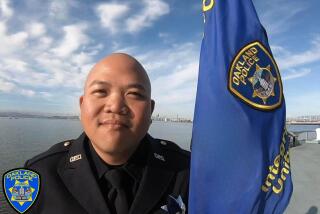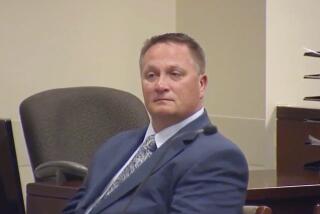Medical Aide Pleads Innocent of Murder in ‘Mercy Killing’ of Uncle
- Share via
PASADENA — A 46-year-old physician’s assistant has been charged with first-degree murder in the “mercy killing” of his terminally ill uncle last September.
Wallace Cooper of Pasadena was charged last week in Municipal Court here after admitting to sheriff’s homicide detectives that he injected his bedridden uncle last Sept. 1 with a lethal mixture of morphine and a potent drug that slows the heart.
Two hours later, the 81-year-old uncle, Wallace Goulden, who suffered from congestive heart failure, kidney failure and fluid in his lungs, died at his Pasadena home with Cooper and other family members at his bedside.
Cooper told police he administered the injection at the request of his uncle, who was in extreme pain and refused hospitalization, according to a police report filed in court. Cooper, who has pleaded not guilty, said in an interview that he will not recant his confession. Instead, he will prepare a legal defense arguing that he intended to kill his uncle, Wallace Goulden, out of a humane desire to end his long suffering.
A preliminary hearing is set for June 12.
‘Right to Die’
Ron Bain, a Los Angeles attorney who will represent Cooper, said he will argue that Cooper’s actions were justified on ethical and moral grounds. Bain said he will either seek to expand case law by contending that a “right to die with assistance” should be recognized by the courts or argue that the facts of the case mitigate Cooper’s actions and he should be charged with a lesser crime.
“At this point, it’s premature to say what route we’ll take,” Bain said. “But we will argue that to equate mercy killing with the most heinous murder is absurd. There must be some middle ground in the law to cover what Wallace Cooper has done.”
Michael Genelin, head deputy district attorney at Pasadena Superior Court, said he would not comment on the case until after the preliminary hearing. “Until evidence is presented in open court, we’re really handcuffed on what we can say,” Genelin said. “I can only say that it promises to be an interesting case.”
Training at Hospital
Cooper, a Pasadena resident who worked in rural Alaska as a physician’s assistant in the late 1970s, said he was enrolled in a one-year training program at County-USC Medical Center at the time of Goulden’s death. For several years, Cooper said in the interview, he oversaw the care of his sick uncle. Cooper said he would often work 12-hour shifts at County-USC Medical Center and then drive to his uncle’s home to care for him.
“Cooper took tremendous care of Goulden,” Bain said. “He did everything in his power to keep him alive until the very last possible moment, until there was no more hope.”
According to court documents, Goulden’s longtime physician told Cooper and other family members last Aug. 15 that Goulden’s heart was failing and suggested that they make funeral arrangements. The next two weeks, according to Cooper’s statements to police, Goulden experienced extreme pain and repeatedly begged Cooper to administer enough pain killer to take his life. “How many more weary miles are you going to make me travel?” Goulden asked relatives, according to Cooper’s statement to police. Three days before Goulden’s death, his family--including his wife and Cooper’s mother and sister--withheld medication that regulated Goulden’s heartbeat, according to a police report. Bain said it was only after this “passive” measure failed that Cooper gave in to his uncle’s pleas and decided to take an “affirmative” step to end his life.
Morphine, Digoxin
Two hours before Goulden died, Cooper told police, he injected his uncle with a combination of morphine and a dosage of digoxin, a strong drug designed to slow the heart.
A few days after the death, Cooper began drinking and missing work, according to court records. It was then that his supervisor at the hospital, Dr. Arnold Zigman, confronted Cooper about his absences and Cooper blurted out that he had killed his uncle, court records show.
On Sept. 15, according to court records, Zigman contacted sheriff’s authorities and Goulden’s body was exhumed to determine the cause of death. Two weeks ago, after three negative toxicology reports, a tissue analysis showed morphine in Goulden’s body. A coroner’s autopsy revealed that Goulden suffered from a serious heart ailment that would have proved fatal.
Cooper was then arrested and released on his own recognizance.
More to Read
Sign up for Essential California
The most important California stories and recommendations in your inbox every morning.
You may occasionally receive promotional content from the Los Angeles Times.













